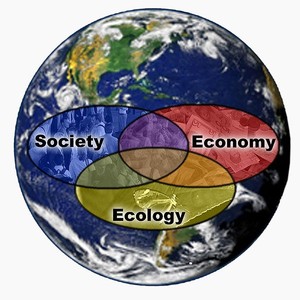Environmental Studies Minor
 The Environmental Studies minor is a 16-hour interdisciplinary program compatible with any major. It offers students an integrated overview of environmental and natural resource fields. This minor should be appealing to both students who are interested in working in an environmentally related field as well as those who are simply interested in environmental issues.
The Environmental Studies minor is a 16-hour interdisciplinary program compatible with any major. It offers students an integrated overview of environmental and natural resource fields. This minor should be appealing to both students who are interested in working in an environmentally related field as well as those who are simply interested in environmental issues.
The environmental studies minor can be an important first step in any career. The movement toward a greener economy means an increase in environmentally related employment opportunities in government, non-profit organizations, consulting firms and industry.
Why choose environmental studies?

The environmental studies minor is a 16-hour, interdisciplinary program compatible with any major. It offers students an integrated overview of the environmental and natural-resource fields, and provides a foundation for anyone interested in working in related fields. The program encompasses courses from a wide variety of academic departments, including biology, economics, English, history, politics and theology. Courses explore such areas as:
- The scientific fundamentals of environmental issues.
- Potential economic and political solutions to environmental issues.
- Environmental perspectives from diverse vantage points.
Curriculum
Students take one introductory environmental science course (BIOL 120, CHEM 102, or PHYS 116), Biology 250/251, Economics 320 (prerequisite: Economics 200), Biology 398, and one approved elective (e.g., Theology 245, Theology 388 and many others).
Required Courses
- Biology 250/251 - ECOLOGY (3.00) + Lab (1.00) The relationships between organisms and their living and non-living environments. Prerequisite: BIOL 160-163, BIOL 120 or permission of the instructor.
- Economics 320 - NATURAL RESOURCE ECONOMICS (3.00) Economic analysis of managing the environment and allocating natural resources. Historical roots and ethical consequences of existing problems and policies are explored. Fulfills the E/RS Focus elective. Prerequisite: ECON 200.
- Biology 398 - ENVIRONMENTAL STUDIES SEMINAR (3.00) An environmental issue is selected and each student is responsible for investigating a facet of the problem. The seminar format provides a mechanism for sharing ideas for proper procedure in investigating the problem, analyzing and interpreting data, and exploring the economic, ecological, and ethical consequences of alternative problem resolutions. Cross-listed Courses: ECON398.
Approved Electives
- Theology 245 - GOD, CREATION and ECOLOGY (3.00) To better understand the environment and the harm being done to it. To better integrate Christian beliefs with environmental concerns.
- Theology 388 - THEOLOGY and ECOLOGY (3.00) Exploration of the philosophical and theological issues underlying a sane approach to the protection of all life-forms within a finite world in which hard choices frequently have to be made.